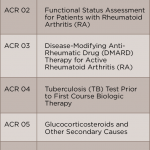
Despite the sometimes dreary weather in central Ohio this time of the year, January can be a wonderful month. We all look forward to the possibilities the new year will bring. Now that 2014 is officially here, I am excited to share the news that the ACR’s Rheumatology Informatics System for Effectiveness (RISE) Registry is scheduled to launch during the first quarter of 2014.
The ACR has been developing RISE for more than two years, and has worked with numerous volunteers to prepare a best-in-class resource to help us manage patient populations and improve patient care. RISE aligns nicely with the ACR’s mission. The combination of simplified clinical data reporting and the other capacities of the registry can lead to important discoveries. RISE can truly help us Advance Rheumatology!
What Exactly Is RISE?
RISE is the enhanced version of the Rheumatology Clinical Registry (RCR) and will provide superior quality reporting and quality-improvement capabilities. Many of us currently use the RCR to report data to the Physicians Quality Reporting System. In developing RISE, the ACR focused on refining its registry to simplify the data entry process. By seamlessly and automatically syncing with electronic health records (EHRs), the registry enhancements can reduce repetitive work for us and our staffs. Entering data into the EHR for the purpose of clinical documentation (and reimbursement) can also seamlessly supply data to the registry for quality reporting and data consolidation purposes.
You might be wondering why RISE matters to the ACR, and more specifically to you. RISE provides four crucial benefits that can impact your work:
- Optimizes patient outcomes;
- Demonstrates the value of rheumatology;
- Meets reporting requirements; and
- Advances the profession through discoveries.
Participation in RISE will allow me to easily view my patient population. I will be able to assess my performance on meaningful quality/process measures, discover and close care gaps, and improve patient outcomes.
Optimizing Patient Outcomes
Improving our patients’ health is the reason we became rheumatologists and rheumatology health professionals. Our patients are the focus of our work, and RISE ultimately can help us improve health outcomes for them.
RISE helps practicing rheumatologists and rheumatology health professionals who are active ACR/ARHP members benchmark performance on key rheumatology clinical-quality measures and align with best practice standards. The benchmarking tool allows users to compare the details of their patient population against established and validated rheumatology quality metrics. RISE also offers access to de-identified aggregate data from other participating sites so users can view the characteristics of their patient population and compare them with other participants’ patient populations.
Demonstrating Value with Key Influencers
The ACR’s vision is that everyone will know and value rheumatology. RISE can help us achieve this by demonstrating the value of our care to many different audiences—most importantly, our patients.



